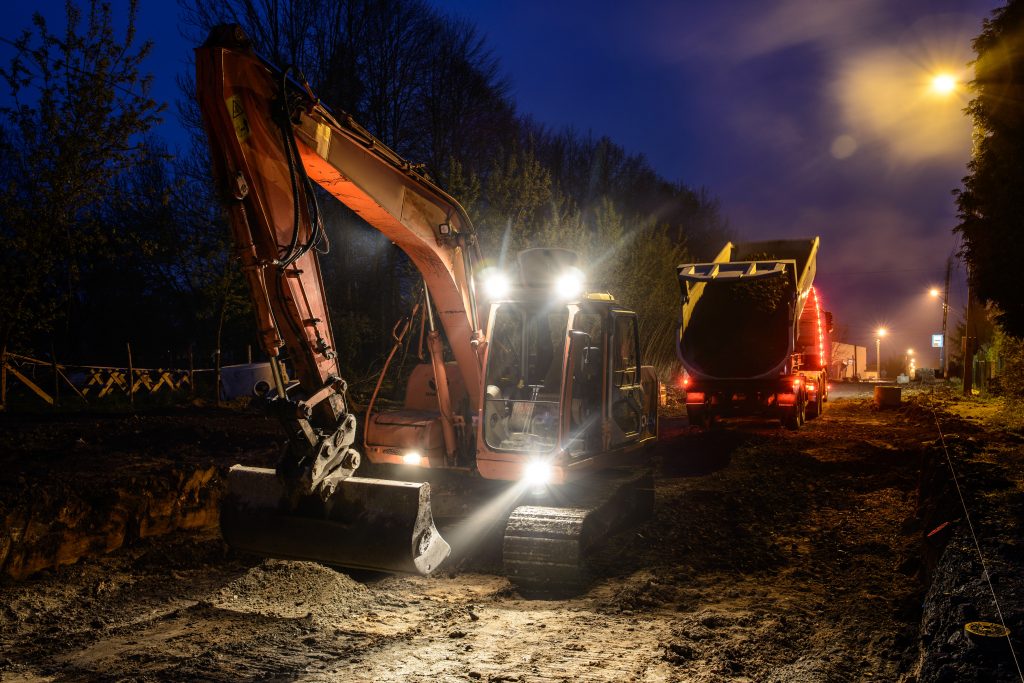It is becoming more common for machine operators to work shifts well into the night to meet their clients’ demands, but such 24/7 service puts immense pressure on hydraulic systems, Hydraulink Fluid Connectors Ltd Chief Executive Robin Simpson says

Heavier workloads for earthmovers, miners, construction and infrastructure, and transport operators are putting the strain on the hydraulic systems of static and mobile machinery essential to their tasks, including graders, diggers, trucks, forklifts, forest and agricultural harvesters, road and rail maintenance equipment, and fixed and mobile cranes.
Virtually everything depends on hydraulics in the world of lifting, moving and heavy machinery. Properly functioning hydraulic actuation provides the muscle to do the job safely and quickly.
Done well, hydraulic servicing can save money and enhance safety on diesel- powered vehicles and machinery of all sizes. Done poorly – just patching up machinery malfunctions, or ignoring warning signs – is an open door to higher costs and a welcome mat to accidents.
If hydraulic service has been done poorly, often the first you may know about it is when hydraulic actuation stops dead. Or the machine may let you know something is wrong through abnormal noise, which experienced operators will immediately recognise as a sign of things to come.
Such faults can often be caused by aeration or cavitation in the hydraulic oil system, which can be a sign of big problems to come. Aeration occurs when air contaminates the hydraulic fluid. Air in the hydraulic fluid makes an alarming banging or knocking noise when it compresses and decompresses, as it circulates through the system.
Apart from costly and extended downtime, a single fault can be deadly where earthmoving equipment is shifting tonnes of rubble in a single bite, harvesting tons of valuable produce in a narrow time frame, grading slopes on infrastructure, lifting loads into heavy trucks and specialist vehicles.
This is a myriad danger because there are scores – sometimes hundreds – of hydraulic hoses and connections upon which earthmovers, graders, cranes, on and off-road trucks, powerful specialist machinery and even the ubiquitous forklifts absolutely depend.
That’s hundreds of opportunities for things to go right or wrong in a single vehicle, and thousands when multiple vehicles are involved. And it is the owner’s choice and Duty of Care to do it right, which is a large responsibility of compliance, traceability and safety.
So how to you know if you are doing right or wrong?
The issue of efficient, effective and safe hydraulic hose service isn’t as simple as having a shed of likely spares on-site and a mobile contact for someone you can call out sometime after something goes wrong.
One of the most important things to have is service staff or service partners who know your machinery, your sites, your work priorities and are available 24/7.
The partnership needs to be like a hand in a glove – the people who are serving you ideally need to know, before they arrive on site, what’s likely to be expected and how to fix it.
Ideally, they need to know both the machinery and the site conditions, which is a matter of experience and efficiency. Otherwise every new issue is a big lesson at the machinery owners’ expense.
If you have to spend half a day educating different people turning up each time, you are wasting your money and your time – then getting a bill for it.
Service partners need to have through familiarity with individual sites and corporate practices – otherwise time and money can be wasted educating them and being billed for it
And if the new service person doesn’t know the safety protocols for your industry, or he is not continuously educated in this changing field, then you may be taking a culpable risk. That’s no exaggeration.
It is the employers’ responsibility, the site owners’ responsibility, to ensure people coming on site have the right qualifications for the job in hand. Otherwise it is back to the classroom again, at your expense.
While experienced staff or partners are essential to predict and prevent failures – with associated time and safety costs and hazards – Simpson says there are some basic checks owners can undertake to help ensure things are right with their costly investments.
These include checking for wear on the outer cover of hoses; leaks at the end of the hose; exposed wires; and removal of kinks or twists in the hose that will prevent flow and cause early failure.
Obviously, prevention here is better than cure, so these are essential routine observations that a competent technician will check so as to prevent breakdown or safety issues arising from failure.
Ask the right questions of anyone who comes on your site:
1. What are their safety compliances relevant to your site? These are absolutely top of the list because all decent operators want to protect their workers – and it is the first thing a statutory body will ask for if there is an accident. Don’t be non-compliant – it can and does shut down business.
2. What is their experience relevant to your machinery and your industry? Familiarity with customer sites and very diverse machinery being worked upon is important, so service technicians do not cost time, money and downtime learning the job at the customer’s expense. Typically, a skilled technician familiar with multiple machinery typical of an industry can do a better job in less than half the time taken by a less skilled or DIY operator.
3. What programmes of continuing education are they involved in? Hydraulic machinery is a fast-moving field, and what was good enough 10 years ago might not be right today.
4. What backing does the individual have – are they continuously involved as part of a big team or are they more of a lone ranger? Can they come out 24/7 if they have to, do they have 4wds to do the remote jobs when these come up, do they have the workshop facilities to handle the bigger jobs needed by all big machinery from time to time?
Experience – and ongoing education – are to be prized. Customers are correctly concerned to ensure they are sent top people. At a site level, good operators can tell you in five minutes about the quality, knowledge and attitude of people who are sent out to help them.
They can pick it – they ask themselves; do they know what they are talking about in your industry? Are they there to make a positive contribution, or to do the job as quickly as possible and get out of there?”
Outstanding hydraulic service is demanding. You have to have deep knowledge and great experience in this area to be able to see issues coming before they arrive. There are huge issues of safety, compliance, machinery knowledge, site knowledge, traceability and accountability involved in big machines.
When servicing hydraulic hoses, fittings and adaptors, mechanics need to be spot on, every time. A faulty hose or incorrect fitting can have dire consequences when operating at high pressure (typically 3,000 – 7,000 PSI in mobile applications).







